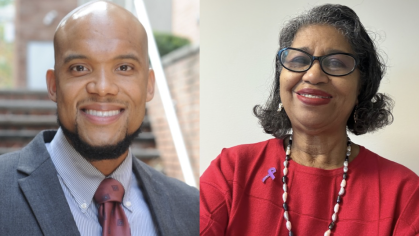Tell us a bit about your journey to social work.
There are many different experiences in my life that have shaped my path to social work. One of the most powerful experiences that led me to start my journey to social work began with the loss of my 19-year-old brother who was killed in a drive by shooting over 19 years ago. His death hit me hard. I took some time to grieve, be with my family and friends, and think about what I was going to do with my life. The loss of my brother and how he died rocked my world. I felt strongly about what I would do next; it needed to be meaningful for my life and be in service of others. I said to myself, “I want to be part of the solution.” Now, during this time, I served in my community by volunteering in different capacities, at my daughter’s school, the local domestic violence shelter, and throughout the community. In volunteering, I sought out trainings on the Internet. In doing my research, I saw workshops that resonated with me. I wondered who these workshops were for, and I learned they were for social workers! During my adolescence I hadn’t heard of social workers—I knew of guidance counselors, crisis counselors, therapists, and case managers. So, I took time to learn more about social work and what social workers do, and I thought this is me and this is what I want to do. I took a leap of faith and decided to apply to Rutgers’ social work program and within a few weeks I got an acceptance letter. I was so thankful, thrilled, and ready to start my social work journey.
What is the significance of Black History Month for you?
I value history, so when I think about the significance of Black History Month I think about its origins. In 1926, Dr. Carter G. Woodson initiated the celebration of the first Negro History Week. I am amazed when I consider the social timing in which the Negro History Week was created – the same time as Jim Crow laws and segregation were taking place. The week chosen was intentional to correspond and honor the birthdays of Frederick Douglas and Abraham Lincoln. In addition, Richard Robert Wright, Sr. made a significant contribution. A personal goal of his was to make February 1st, the day Lincoln signed the 13th Amendment, National Freedom Day. In 1948, President Truman signed that into law. The day was later designated Black History Month, which aligned with the Negro History Week (https://www.cbsnews.com/video/how-a-former-enslaved-person-helped-make-b...).
When the week was expanded to a month in 1976, President Gerald Ford officially recognized Black History Month, calling upon the public to “seize the opportunity to honor the too-often neglected accomplishments of Black Americans in every area of endeavor throughout our history” (https://www.history.com/topics/black-history/black-history-month). In addition to being a time to celebrate African Americans, it became a celebration of the Black experience and its impact on the United States. The month gave recognition to the contributions, triumphs, and struggles of Black Americans. It has come to mark our significance and our existence in this nation.
Today, it’s important to understand that over these past two years the Black community has continued to endure losses and pains from COVID-19, systemic racism, structural discrimination, political unrest, and police brutality. When we think about these experiences, they remind us of the hardships that our ancestors and elders endured that we are still experiencing. We need, more than ever, the space and time to honor African American people – our culture, contributions, community, struggles, and triumphs. We must be able to affirm progress, which means we need to give recognition to seeing and acknowledging that Black history is American history. When you ask, “What does Black history mean for me?” it is a time to first and foremost celebrate how Black history is American history, our contributions and struggles, and the need for a “balance of stories.” It is also a time to center the celebration and affirmation of Black life, experience, history, and contributions in accordance with the vision of Dr. Carter Woodson. Affirming the need for “balanced stories,” as Nigerian author Chinua Achebe said, focuses on counternarratives that center the voices and lived experiences of Blacks. It’s hard to hear someone’s experiences that you hold differently in your mind, but to believe what is said, respect what is said, and to celebrate alongside is so important to do.
What are some ways people can commemorate/celebrate Black History Month?
This is a time to celebrate the Black community and learn exactly what the Black experience is in America, and what the Black experience has been like in the United States. It is important to take time to learn the whole story and get a “balance of stories.” There are many different stories of Black experiences that are saturated in a deficit perspective. Here is an opportunity to fill the gaps of knowledge that are missing and challenge the misinformation perpetuated. It’s a time to learn about Black history, our contributions, and struggles we are still facing in the United States from our perspective. There are so many virtual events, documentaries, podcasts, and resources available online this month and beyond February that you can feast on throughout the rest of the year. Also, check out the Association for the Study of African American Life and History website (asalh.org), which comes up with the themes for Black History month and so much more. This year’s theme is Black Health and Wellness. I implore you to visit the site, because there is so much great information, events happening, and resources available.
What can the social work profession or social workers do to direct attention toward Black History beyond this month?
We need to do what the profession does best: advocate, fight for social justice for all, and create change. Social workers are in just about every industry in this nation. We need to take hold of more leadership positions and sit at more decision-making tables to bring to fruition a more just and inclusive society for all. There is a need to utilize social workers’ power and voice to shape and inform policies and practices. All social workers must recognize and understand the complex effects of structural discrimination on Black lives within this society that has historically discriminated, oppressed, excluded, and dehumanized Blacks in violent ways, which resulted in marginalization. Social workers must join with the Black community in the fight for equitable changes.
Social workers know they play a central role in providing behavioral and mental health services for many communities in our nation. As individual social workers, we need to cultivate and embrace counternarratives that empower and create a sense of dignity for Blacks. As a profession, we need to ensure that we have counter-narratives that are empowering, celebratory, full of dignity, and accurate depictions of the Black experience and community. As practitioners, whether on the macro or clinical side, we need to embrace cultural humility and honor the Black community members we serve as the experts of their personhood and life. When we take this approach, we move beyond acknowledging and celebrating the Black community for just a month.
What we can do beyond this month is cultivate, create, and affirm the counter-narratives that make up a “balance of stories.” Chinua Achebe captured it well when he said, “And this is really what I personally wish this century to see—a balance of stories where every people will be able to contribute to a definition of themselves, where we are not victims of other people's accounts. This is not to say that nobody should write about anybody else—I think they should, but those that have been written about should also participate in the making of these stories.” So, in our interventions, treatment plans, programming, decision-making, policy making, etc., the individuals, families, and communities we serve should be a part of making and shaping their stories and experiences.
Finally, I implore everyone to join in solidarity and do the work to create a culture of equity and inclusion. I am thankful for the work of my ancestors and their allies. I stand on their shoulders. The path I walk was carved with their sacrifice, tears, bloodshed, sweat, and hope for a better future for generations to come. I invite the social work community to join me in becoming a good ancestor. We inherited this society in the state that it’s in, but it is on us to make the transformative changes so we can pass onto generations we will never meet, a society that is more just with a culture of equity and inclusion. Harambee! (Let’s all pull together!)
This story was created in partnership with Rutgers School of Social Work's Inclusion, Intersectionality, Diversity, Equity, and Advancement (IIDEA) Committee in support of our commitment to diversity, equity, and inclusion.



